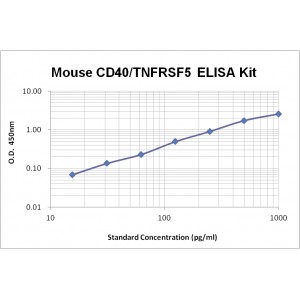More info
Assay Range | 15.6-1,000 pg/mL |
Sensitivity | 1.0 pg/mL |
Size | 96T |
Storage | Store at 2 - 8ºC. Keep reconstituted standard and detection Ab at -20 ºC |
Assay Principle | Sandwich ELISA |
Sample Volume | 100 µL final volume, dilution factor varies on samples |
Detection Method | Chromogenic |
Kit Components
1. Recombinant Mouse CD40 standard: 2 vials
2. One 96-well plate coated with anti-Mouse CD40 Ab
3. Sample diluent buffer: 12 mL - 1
4. Detection antibody: 130 µL, dilution 1:100
5. Streptavidin-HRP: 130 µL, dilution 1:100
6. Antibody diluent buffer: 12 mL x1
7. Streptavidin-HRP diluent buffer: 12 mL x1
8. TMB developing agent: 10 mL x1
9. Stop solution: 10 mL x1
10. Washing solution (20x): 25 mL x1
Background
CD40, also known as TNFRSF5 (Tumor necrosis factor receptor superfamily member 5), B-cell surface antigen CD40, Bp50, or CD40L receptor, is a glycosylated type I transmembrane protein belonging to the TNF receptor superfamily. Mature mouse CD40 consists of a 174 amino acid (aa) extracellular domain (ECD) with four TNFR repeats, a 22 aa transmembrane segment, and a 74 aa cytoplasmic domain. The ECD of mouse CD40 shares 58% and 83% aa sequence identity with human and rat CD40, respectively. CD40 is expressed on various cells such as B cells, dendritic cells, monocytes, macrophages, T cells, neutrophils, platelets, fibroblasts, smooth muscle cells, epithelial cells, endothelial cells, neurons, as well as in many hematopoietic and epithelial cancers. Expression of CD40 is inducible in response to inflammation.
CD40 is a ligand for the transmembrane glycoprotein CD40 Ligand/CD154 (CD40L). CD40L is upregulated on T cells, B cells, dendritic cells, neutrophils, platelets, vascular endothelial cells, and smooth muscle cells during activation or inflammation. CD40L can be expressed on the cell surface in heteromultimers of different isoforms. Soluble CD40L has been found and it has been shown that both the membrane bound and soluble forms of CD40L induce signaling through CD40. CD40/CD40L signaling plays an important role in humoral immunity, cellular immunity, and inflammation. CD40L on activated CD4+ T cells provides a costimulatory signal that augments B cell proliferation, germinal center formation, immunoglobulin class switching, and antibody secretion. CD40 signaling regulates lymphocyte development and the balance between immune self-tolerance and autoimmunity. CD40-mediated responses are modulated by TLR, RANK, and TNF receptor activity through intracellular signaling transduction or direct interaction of CD40 with those receptors.


